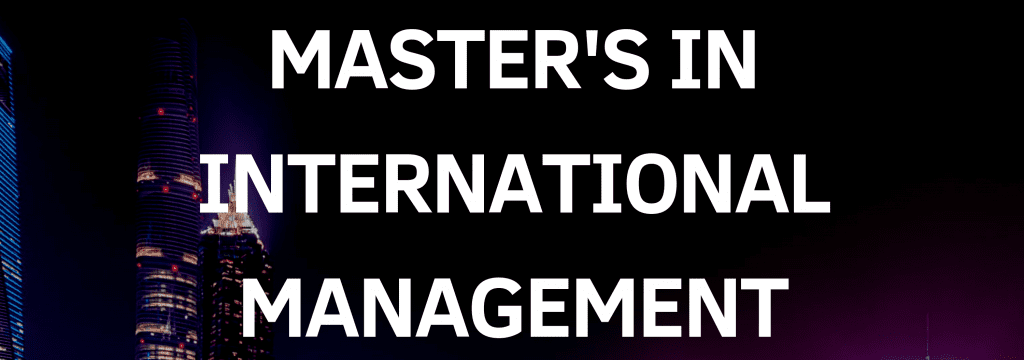A Guide to the Specialized Master’s in International Management

Welcome to MetroMBA's Master's in International Management Guide. As the world's best business schools continue to evolve, traditional MBA programs are being replaced or supplemented with specialized master’s degrees. For many schools, that means including a Master's in International Management program to provide graduate training for those seeking to develop careers in a global economy.
Scroll down to find some of the world's best Master's in International Management degrees offered by the world's leading business schools: a list that continues to grow year by year. But first, what is a Master's in International Management, what does it take to graduate, and what career opportunities are available after graduation?
What is a Master of International Management?
A Master’s in International Management (MIB) degree combines international business, international political economy, and the learning of languages and world cultures. It’s designed for business professionals seeking to establish or accelerate their career in international business and the global economy.
The degree focuses on international operations, offering an in-depth understanding of strategic planning and organizational capabilities required for global business. It includes specialized learning in areas such as international marketing, finance, and human resource management. It also addresses topics such as imports and exports, intercultural communication, and multinational corporations.
The end goal of an MIB degree is to broaden students’ cultural awareness as well as their professional life. Students should walk away from the degree with a better understanding of different traditions and practices along with the ability to adapt to new locations and ideas.
Typical Coursework
Students who choose a Master's in International Management degree will take advanced business courses that help them adopt a global perspective. Those courses are accompanied by studies in economics as well as specific studies in the governments of other countries. The goal of the coursework is to teach students how to operate in multi-cultural situations and environments.
Another essential aspect of the curriculum are foreign language skills. In many programs, students are required to complete a study abroad component to help increase their appreciation for other cultures.
Typical classes include:
- Economics and Global Environment
- Corporate Finance
- Financial Markets
- Global Operations
- International Business Strategies
- Business Policy
- Global Supply Chain
Most business school also encourage internships or a capstone project where students participate in real-world challenges. The goal is to give students hands-on, practical knowledge in their given career choice. Beyond that, depending on the program, you may have the option to customize your coursework to a more specific area of finance. For example, you could take courses in:
- Mergers and Acquisitions
- Design & Marketing
- Hedge Funds
- Corporate Entrepreneurship
- Family Business Management
Program Accessibility
Most Master’s in International Management programs tend to be one year in length, though many others require a full two years for graduation. Programs can be full-time or part-time, residential or online, it all depends on the exact program you choose. However, most of the top programs are full time, requiring students to take courses in different countries and cultures.
Admissions into an MIB program can vary based on the business school, but typically requires a high level of excellence in grades, test scores, professional experience, and communication. Applications may consist of:
- Competitive TOEFL, IELTS, or PTE scores (if you did not graduate from an English-speaking university)
- International Experience
- Resume (work experience ranges from two to 10 years, but averages around two-to-five years)
- Essay
- Letters of Recommendation
- Academic Transcripts
- GMAT or GRE (averaging quantitative scores in the top 80%)
At minimum, applicants are expected to have at least two years of work experience under their belts, preferably international with strong leadership experience. Students also have to be willing to study abroad on multiple campuses and in a multicultural class with many different nationalities and a broad range of professional backgrounds.
Typical Cost
Tuition varies greatly among top business schools. It ranges from $50,000 to $100,000 USD for a year plus living expenses. This cost does not include expenses for study abroad programs. In many cases, funding is available for MIB students in the form of scholarships, fellowships, employer sponsorship, and teaching assistantships. There are also loans and external financial support sources available.
Career Opportunities
Graduates of a Master’s in International Management are equipped for careers in global business. They should have sufficient skills to be leaders in a variety of environments and in a range of situations where they would be critical to the decision-making process. Career opportunities are diverse and plentiful, and typically include large corporations where global operations take place.
Most often, graduates will work for a business that either has offices in multiple countries or markets their products abroad. Graduates tend to take leadership positions in these companies, displaying their skill in the competitive international labor market. Popular industries include consulting, technology, consumer goods, financial services, and health/pharma.
MIB graduates are highly sought-after employees. Potential job options include:
- Marketing executive
- Public relations account executive
- Sales executive
- Supply chain manager
- Human resources office
- Financial trader
- Data scientist
- Business development manager
The salaries for a Master’s in International Management graduate varies depending on the final career field. According to Payscale, the average salary is $81,000. However, the highest paid earn $139,000 while some of the lowest paid earn $74,000. Here’s how that breaks down:
Sales Director: $74,123
Senior Financial Analyst: $75,960
Business Analyst (IT): $86,673
Human Resources Manager: $102,950
Operations Director: $116,213
Technical Advisor: $139,810
The Top Master's in International Management Programs

The University of St Gallen in Switzerland offers the top-ranked international Master's in Management program in the world, according to The Financial Times. The publication has crowed the program as the best in the world every year since 2011.
The MA in Strategy and International Management (SIM) offers one of the highest salary averages on the planet, with grads pulling in an estimated $108,621 USD three years after earning their degree. A typical graduating class features 51 students at an average age of 24-years old. The most recent class is also one of the most gender balanced in the academic world, with 53 percent male students and 47 percent female students.

Barcelona's highly-regarded ESADE (Escola Superior d'Administració i Direcció d'Empreses) at Ramon Llull University hosts one of the world's most-celebrated MSc in International Management programs. The one-year program features a maximum of 70 students in two separate program sections, starting every year in September. Students can also take an optional internship during the program, lasting anywhere from three to six months.
ESADE MSc graduates earn employment at a rate of 84 percent within three months of earning their degree, earning an average of €43,484 ($48,944 USD). The majority of graduates, 51 percent earn various roles in the consulting industry.

The London Business School Global Masters in Management (Global MiM), delivered jointly with Fudan University in Shanghai, delivers two specialized masters in a two-year, full-time program: a Masters in Management (MiM) and a Masters in Science (MSc) in International Business.
An estimated 100 percent of the most recent graduating class earned career offers within three months of earning their degree, with clear, definitve employment advantages in both English-speaking countries and China.

The MSc in International Management program at the SDA Bocconi School of Management offers applicants a truly global masters program, working in partnership with 31 universities. The program is the sixth highest-ranked Master's in Management program in the world, according to the Financial Times.
Graduates from the program boast a near 99 percent employment rate within one year of earning their degree. The FT estimates that SDA Bocconi MSc in International Management grads earn a roughly-weighted annual salary of €68,699 (over $77,000 USD); a 61 percent salary increase after earning the degree.

The 12-month MSc Business Administration/Master in Management at the Rotterdam School of Management at Erasmus University in the Netherlands is billed as one of the more challenging masters programs in the world, but one of the most rewarding. Financial Times data indicates that program graduates should expect an annual salary increase of around 45 percent, with a three-year post grad annual salary average of $78,922 (USD). The program also gets special marks from the publication for "International Mobility" rank, placing it second best in the world.
 Loading Programs
Loading Programs
